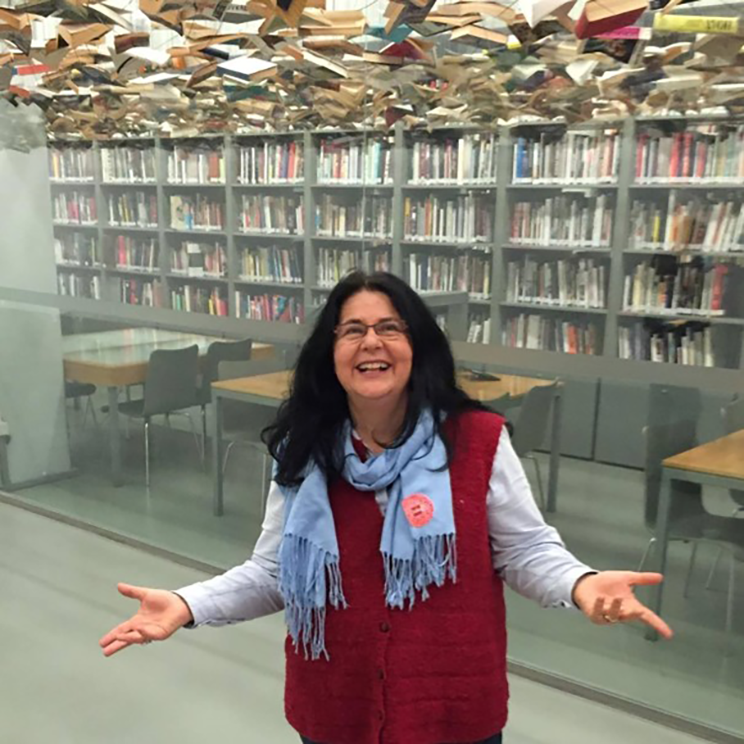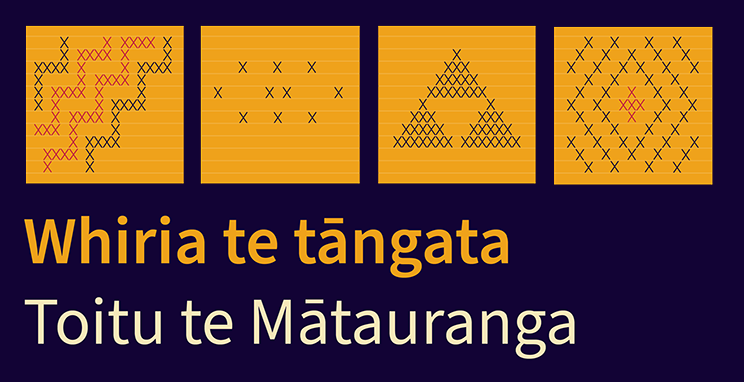The weaving continues
Amanda Bond, Facilitator (National Capability) with National Library Services to Schools and a Kākaho in the Whiria te Tāngata programme writes about the sustainability for all libraries, including school libraries.
The weaving continues
Whiria te Tāngata – weaving the people together, continues into this new year that has had so many challenges for us all at the whims of storms and cyclones. Resilience and sustainability seem to be top of mind for everyone, everywhere in our nation. We are stronger together and it is with this truth in mind that Whiria te Tāngata Kākaho continue with our mahi.

Amanda Bond.
Sustainability for all libraries – including school libraries
My focus within Whiria te Tāngata is to see how our work can strengthen school librarians and school libraries. My background as a secondary school teacher (English and Social Sciences) and later a school librarian, and in my current role working for Services to Schools with the National Library, enables me to work alongside school librarians, helping them to bring all the goodness of libraries to the students and teachers in their schools.
Not every school has a library and not every school library has a librarian. In schools that do have libraries, there is some amazing work being done by dedicated enthusiasts (often people who work in other roles in the school) who know the value libraries bring to the learning and teaching in our schools. The National Library website puts it best in the article Why school libraries matter
School libraries matter because they can help every member of your school community — students, staff, families, and whānau — gain new knowledge, skills, and dispositions for learning and personal development that they will use throughout their lives.
My work within Whiria te Tāngata is to see how the workstreams and frameworks can assist with the development and sustainability of school libraries.
Current education landscape
The development of school libraries is at the heart of a literate nation. The current discussions both within schools and wider communities about curriculum refresh and literacy offer an opportunity for school librarians to show how valuable their work is. Te Mātaiaho, the Curriculum refresh, like Whiria te Tāngata, has the metaphor of weaving at its heart with the key elements of ‘Understand, Know, Do’ underpinning the progressions students make in every curriculum area.
The Aotearoa New Zealand’s histories curriculum, released last year, has many aspects that can benefit from a school library’s resources and help to develop learning skills like collecting, analysing, and using sources.
The English curriculum has a learning practice for all students which is “Te pānui hei whakangahau, hei whakapārekareka | Reading for pleasure. Reading for pleasure involves ākonga choosing a variety of texts (featuring, but not limited to, written language) based on their own preferences and interests.” (1).
One aspect often overlooked in the debate on literacy development by all sides is the value of reading for pleasure. There are clear links between reading engagement and academic success. When students enjoy reading, select books for themselves and choose to read for fun their well-being and school success is positively impacted. That is one reason why reading for pleasure appears in the English Curriculum refresh. Clearly having a well-resourced library would assist students in developing this.
Whiria te Tāngata and school libraries
Every work stream in Whiria te Tāngata has a connection with school libraries
Mātauranga Māori
Mātauranga Māori underpins all of Te Mātaiaho, the Curriculum Refresh so for school libraries their role in embracing mātauranga Māori is expected and essential. It is very encouraging to see so many schools embracing the opportunity to step into what for many will be a mindset of tikanga and Treaty partnership.
Te Tōtara – workforce capability
Librarianship has a unique set of skills and knowledge. Many school librarians come into this work through enthusiasm for reading, libraries, and learning without a background in librarianship. The workforce capability framework is a way to describe the professional attributes of librarianship and shows how these can be developed.
Data, research and evidence
Providing evidence of impact is such a powerful way to show value. School libraries are often thought of as a nice option if we can afford it. A growing body of research about the value and impact of school libraries shows that they are very important to the success of our students. The Data, Research and Evidence strategy looks at how to develop ways to gather and interpret data, to communicate findings in a way that shows impact. School libraries can do this within their own communities.
Collective impact
Together we are stronger. Many school libraries already partner with other school libraries, SLANZA (School Library Association of New Zealand Aotearoa) Public Libraries, and the National Library to bring great outcomes for their students and teachers. Sharing resources, knowledge and skills is something all librarians are very good at. A great example of this recently has been the Pūtoi Rito Communities of Readers, a National Library initiative that has seen a number of projects across the country to support children and young people develop reading for pleasure.
All schools deserve a great school library
Ahokoa he iti pounamu | Though it is small it is a great treasure. School libraries may be some of the smallest libraries in New Zealand, but they provide treasure for their school communities. The work school librarians do has a lasting impact for their students and teachers. I truly appreciate the opportunity provided in Whiria te Tāngata to explore deeply how school libraries can be further strengthened and become more sustainable in the future.
Footnotes
1 — p52, Te Mātaiaho draft for feedback
More about Whiria te Tāngata

The purpose of Whiria te Tāngata is kia toitū te mātauranga | Weaving the people together to ensure the long-term sustainability of the library sector that is widely valued, used, enabled to deliver positive social and economic outcomes for Aotearoa.
Whiria te Tāngata is a mātaruanga Māori led project.
Library sector workforce capability framework project — includes Te Tōtora workbook